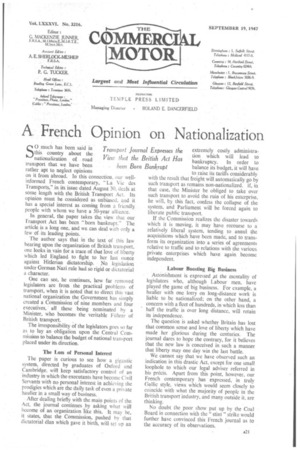A French Opinion on Nationalization
Page 23

If you've noticed an error in this article please click here to report it so we can fix it.
Transport Journal Expresses the View that the British Act Has hew Born Bankrupt
S0 much has been said in this country about the nationalization of road transport that we have been. rather apt to neglect opinions on it from abroad. In this connection, our wellinformed French contemporary, "La Vie des Transports," in its issue dated August 30, deals at some length with the British Transport Act. Its opinion must be considered as unbiased. and it has a special interest as coming from a friendly, people with whom we have a 50-year alliance.
In general, the paper takes the view that our Transport Act has been " born bankrupt." The article is a long one, and we can deal with only a few of its leading points.
The author says that in the text of this law bearing upon the organization of British transport, one looks in vain for a trace of that love of liberty which led England to fight to her last ounce against Hiderian dictatorship. No legislation under German Nazi rule had so rigid or dictatorial a character.
One can see, he continues, how far removed legislators are from the practical problems of transport, when it is noted that to direct this vast national organization the Government has simply created a Commission of nine members and four executives, all these being nominated by a Minister, who becomes the veritable Milner of British transport. .
The irresponsibility of the legislators goes so far as to lay an obligation upon the Central Commission to balance the budget of national transport placed under its direction.
The Loss of Personal Interest The paper is curious to see how a gigantic system, directed by graduates of Oxford and Cambridge, will keep satisfactory control of an industry in which the executants have become Civil Servants with no personal interest in achieving the prodigies which are the daily task of even a private haulier in a small way of business.
After dealing briefly with the main points of the. Act, the journal continues by asking what will become of an organization like this. It may be, it states, that the Commission, pushed by that dictatorial élan which gave it birth, will set up an extremely costly administration which will lead to bankruptcy. tn order to balance its budget,. itwill have to. raise its tariffs considerably with the result that freight will automatically go by such transport as remains non-nationalized. If, in that case, the Minister be obliged to take over such transport to avoid the ruin of his enterprise, he will, by this fact, confess the collapse of the system, and Parliament will be forced again to liberate public transport.
If the Commission realizes the disaster towards which it is moving, it may have recourse to a relatively liberal system, tending to annul the acquisitions which have been made, and to transform its organization into a series of agreements relative to traffic and to relations with the various private enterprises which have again. become independent.
Labour Boosting Big Business Astonishment is expressed jat the mentality of legislators who, although Labour men, have played the game of big business_ For example, a haulier with one lorry on long-distance work is liable to be nationalized; on the other band, a concern with a fleet of hundreds, in which less than half the traffic is over long distance, will retain its independence.
The question is asked whether Britain has lost that common sense and love of liberty which have made her glorious during the centuries. The journal dares to hope the contrary, for it believes that the new law is conceived in such a manner that liberty may one day win the last battle.
We cannot say that we have observed such an indication in this drastic Act, except for one small loophole to which our legal adviser referred in his précis. Apart from this point, however, our French contemporary has expressed, in truly Gallic style, views which would seem closely to coincide with what the majority of people in the British transport industry, and many outside it, are thinking.
No doubt the poor show put up by the Coal Board in connection with the "stint " strike would further have convinced this French journal as to the accuracy of its observations.












































































